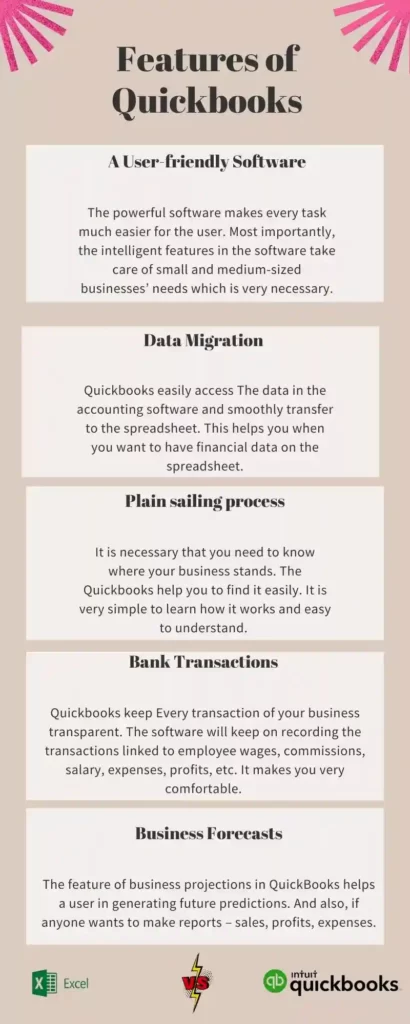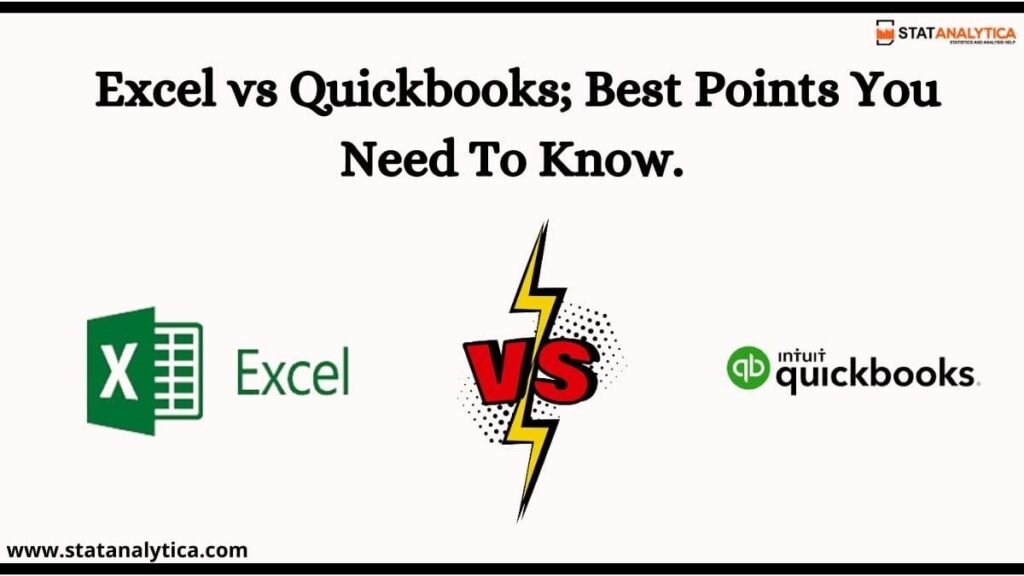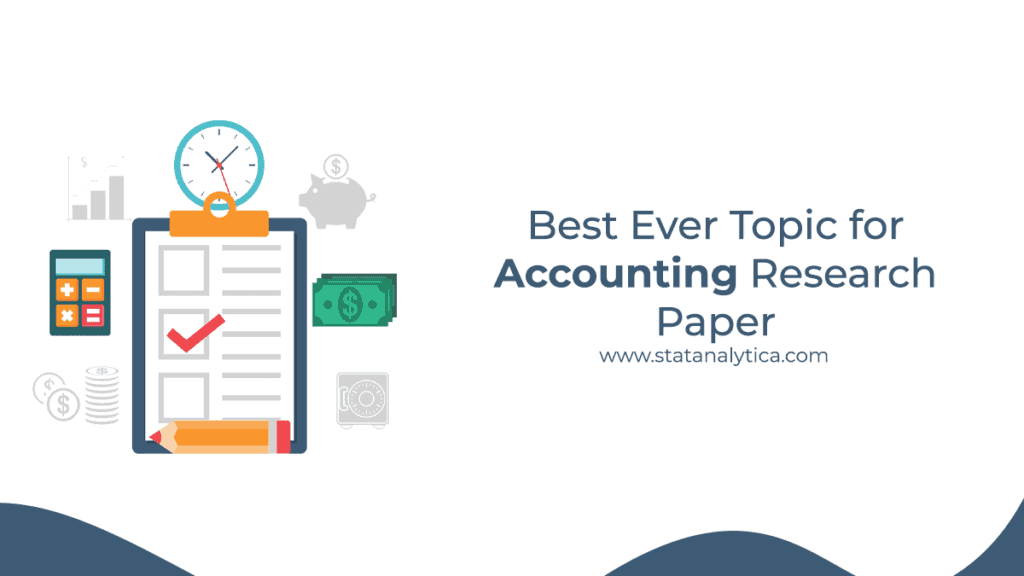Hello, if you are a student or business owner who would like to know how to run a business with the help of accounting software Or a business professional who would like to advance their career by learning accounting software, including Quickbooks and excel. This blog will help you to let you know about excel and Quickbooks, and also you will get to know excel vs QuickBooks. What are the major differences between both of them and also which is a better option to use? An accounting student would like to apply the accounting concept to real-world software, including QuickBooks. He put the same information into excel to apply to the real-world concept, and that works on problems much faster. So let us start with some basic detail about QuickBooks and Excel, then will move to excel vs QuickBooks.
Knowing your company’s current financial health is one of the most critical components of running a business. If you don’t know how your company is performing financially, you could be making a loss. This is why they understand their corporate finances better. Organizations have begun to use accounting software such as excel vs QuickBooks. What about Excel, though? Let’s compare QuickBooks and Excel to discover how they vary.
Excel Meaning or What is Excel used for?
Table of Contents
Excel is a Microsoft spreadsheet software program that uses formulas and functions to organize numbers and data. It creates a desirable sheet that can be easy to understand and modify. We can use Excel to analyze businesses of all sizes all around the world to undertake financial analysis.
Meaning of spreadsheets
A spreadsheet is an electronic document where you can arrange data in rows and columns and be easily managed and used in calculations.
In discussion, Excel vs Quickbook, you also need to know what Excel is used for?
Excel is widely used in all financial activities. Excel is interesting because it allows users to create new spreadsheets with formulas. They calculate anything from a simple regular budget to a full corporate annual report. Excel is also used to organize and track common information, such as a list of sales leads, project status reports, contact lists, and invoicing. Finally, Excel is an effective tool for conducting scientific and statistical analyses on large data sets. Variance analysis and charting complex data can all be done with Excel’s statistical formulas and graphing.
Excel is commonly used for data organization and financial analysis. It utilizes in all business functions and by businesses of all sizes. The main uses of MS excel are:-
- Data entry
- Data management
- Accounting
- Financial analysis
- Charting and graphing
- Programming
- Time management
- Task management
- Financial modeling
- Customer relationship management (CRM)
Quickbooks: An Online Accounting Software
Quickbooks is online accounting software for small business owners, accountants, self-employed, and people starting a business. This software helps you create GST Invoices effortlessly. It also tracks money through online banking; and manages inventory, staff, and payroll, all at your fingertips easily.
Have great features for your bookkeeping and accounting needs. Quickbooks Online is simple and easy-to-use accounting software that powers your business. It introduces several suitable solutions for anyone, from a freelancer to a small business. QuickBooks has several options, but for most new companies, I recommend QuickBooks Online. We will discuss all these in Excel vs Quickbooks.
You don’t need a bookkeeper or accountant because it’s user-friendly cloud accounting software. All of your customers and suppliers can be easily managed in one place. Manage bills and invoices by having access to accounting information at any time, from any location, on any device. With the help of the trial balance, income statement, balance sheet, and cash flow statement. You can easily generate accounting and management reports to assist you in making key financial decisions.

Features of Quickbooks
- A User-friendly Software
The powerful software makes every task much easier for the user. Most importantly, the intelligent features in the software take care of small and medium-sized businesses’ needs which is very necessary.
- Data Migration
Quickbooks easily access The data in the accounting software and smoothly transfer to the spreadsheet. This helps you when you want to have financial data on the spreadsheet.
- Plain sailing process
It is necessary that you need to know where your business stands. The Quickbooks help you to find it easily. It is very simple to learn how it works and easy to understand.
- Bank Transactions
Quickbooks keep Every transaction of your business transparent. The software will keep on recording the transactions linked to employee wages, commissions, salary, expenses, profits, etc. It makes you very comfortable. Because you can access this information from anywhere through Quickbooks online.
- Invoices Generation
Because of its portability, it gives you the benefits of Easy generation of invoices. You can generate it from your smartphone, tablets, and computer system from anywhere in the world.
- Tax Calculations
The feature of tax calculations in Quickbooks gives you the feasibility. It calculates tax for your firm in an immediate, reliable, and effective way.
- Business Forecasts
The feature of business projections in QuickBooks helps a user in generating future predictions. And also, if anyone wants to make reports – sales, profits, expenses. It becomes very simple for them to figure out all the things with business projections.
The Analysis Of Excel vs QuickBooks
In the past analyzing Excel vs Quickbooks, knowing how to use spreadsheets effectively was valuable skills. Spreadsheet Media could assist you in solving any equation or mathematical problem. The only problem is that these Experts are the only ones who know how to use the spreadsheet. That is no longer the case with modern accounting software, as anyone can learn to use QuickBooks. In fact, QuickBooks’ tools and reports far surpass those of its predecessors.
Excel vs QuickBooks for Small Business
No doubt, Excel is excellent for an escalating entrepreneur who is still using their bank account for business objectives. But at some points, Excel becomes impractical and useless when a business owner needs a clear and present understanding of their company’s finances. So, that’s the time when they need to think and get a better solution for this Quickbooks or Excel for small businesses?
There are many things that QuickBooks can do easily and Excel can’t? Let us discuss some of them.
- How to Manage income?
- How to Manage sales
- You can Track bills and expenses easily
- Forecast and project future earnings
- How to Run payroll
- Best Way to Manage tax payments
- Easy Track inventory
- Easily Accept online payments from vendors and customers
- Scan receipts for expenses
Excel vs Quickbooks Accounting Software Comparison
Microsoft Excel isn’t an accounting software
Excel isn’t an accounting program, as you may have imagined. Is it useful for accounting? Yes. Is it solely a bookkeeping program? Perhaps in the past, but in today’s accounting environment, it has very little to offer. Excel is a spreadsheet-based program in the modern world, and spreadsheet-based programs aren’t the easiest to use. They’re out-of-date and potentially dangerous to your business.
Firms have lost billions of dollars as a result of minor spreadsheet errors. That is, after all, the issue with spreadsheets. They don’t evaluate or analyze. They simply do what you tell them to do, and if you feed them incorrect data, you’ll get incorrect results, which can result in massive losses.
Excel is a very simple program. If your business consists solely of selling items from your basement, it’s ideal for keeping track of your finances. For a real business, however, you need something much more powerful and dedicated, regardless of how small or large, it is. That is why, when given a choice between Excel Vs QuickBooks, many businesses prefer QuickBooks.
Is QuickBooks Better Than Excel in the discussion Excel vs Quickbooks?
Here are a few reasons for the Excel vs Quickbooks conflict:
- QuickBooks is specifically designed to keep track of your finances.
- Accounting software today helps to take advantage of high-impact trends. You can speed up your business planning, track transactions. It can also interpret data categories like accounts receivable and payable by reporting an analysis. You must create and maintain these processes yourself when using Excel.
- QuickBooks provides you with an audit trail that shows you when, where, and who made changes. Everything is done manually in Excel. You don’t have any records to fall back on.
- QuickBooks can help with forecasting and budgeting by tracking historical data. In the current climate, having an audit trail for your business may be necessary. This includes the core functions of modern accounting software.
- The office isn’t the only place where you can conduct business. Users can access their documents and financial records from anywhere in the world using advanced accounting software. All you need is a simple login to use QuickBooks. You’ll have to wait until Monday morning to check your statements if the only copy of your financial system is on someone’s computer back at the office.
- QuickBooks, unlike Excel, generates its reports to help you with your business planning.
- QuickBooks takes care of all the backend math, resulting in a significant increase in inaccuracy.
- The formula in QuickBooks is pre-built and double-checked by a team of experts. When it comes to Excel, you must be a pro. You must develop, create, and maintain your formula, which may or may not be correct. Misplaced data, broken formulas, lost files, and other errors are all possible in Excel.
Here are some more reasons in conflict (Excel Vs Quickbooks)
- QuickBooks is a simple and easy-to-use program. It’s much easier for your new bookkeeper to work with QuickBooks. Because it figures out how to transfer your existing Excel document into their ledger. If you ever decide to outsource your accounting or bookkeeping.
- QuickBooks is user-friendly and was created by people who understand accounting and how it should be done. You must design the accounting process in Excel.
- With the most up-to-date and accurate financial reports, QuickBooks keeps everyone on the same page. Excel makes it more likely for you to face inconsistent spreadsheets as your small business grows. When inconsistencies occur, determining why the error exists and which spreadsheet is correct can be difficult. This is a risk that QuickBooks eliminates in Excel vs Quickbooks.
- QuickBooks is cloud-based accounting software. You can use it at any time and from any location. You aren’t reliant on a single piece of technology.
- Your financial data is safer with modern accounting software. Other users in the unit may have access to your saved workbooks if you use Excel. It’s not always easy to track down edits or deleted content after another user has made them.
- Modern accounting software allows business owners to focus on other aspects of their operations. The manual labor required to organize your books on Excel spreadsheets may be too much for a small business. You can focus on business growth while also pursuing your passions with QuickBooks.
Conclusion(Excel Vs Quickbooks)
To conclude the Microsoft Excel vs Quickbooks discussion. Both Excel and QuickBooks have their own features and benefits. You have to choose according to your need and requirement. Choose Excel if you want the freedom to do whatever you want with your financial data. Quickbooks is for you if all you want to do is simply (or quickly) enter your financial records. Use Excel if you need to create sophisticated graphs and charts. Only accounting graphs are available in Quickbooks.

